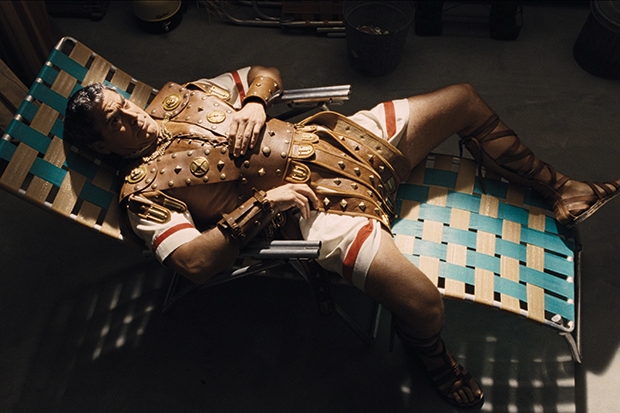The latest film from the Coen brothers is a comedy set during the ‘golden age’ of Hollywood and in some respects it is utterly delicious. George Clooney wears what is effectively a leather miniskirt throughout, which may not be ‘age-appropriate’, as they say, but is wholly pleasing. (I was personally delighted, I must confess.) And Ralph Fiennes finally nails it comedically, which is a relief, as it’s been just so painful watching him try down the years. But the film is also troublesome, just as so many of the Coen films are troublesome. Why? Why this film, and what do they want us to take from it? Is it as inessential as it seems? The Coens always take you on a ride, you’re just never sure if you’re also being taken for a ride. That’s why I’m suspicious, every time.
Set in 1951, and fruitily narrated by Michael Gambon, for some reason (the narration, not Gambon, whose fruitiness is beyond question), the action follows the stress-filled life of Eddie Mannix (Josh Brolin), the fixer at Capitol Studios. Mannix has his work cut out as it’s not like today, where Kate Winslet goes to the shops, or burps, and we all know about it. (If she burps while going to the shops that’s a full page in Heat, right there.) This was back at a time when movie stars had to be kept whiter than white in the general public’s mind while maintaining their mystique. There was, apparently, a real Mannix, who worked for MGM, who sounds like a total thug, but the Coens have chosen to make our Mannix a decent man: a good Catholic who is sensible, wise, cool-headed and paternal as he strides from film set to film set, putting out a fire here, putting out a fire there, and the fires do abound.
The star (Scarlett Johansson) of their Esther Williams-style aquatic movie is up the duff but unmarried. A dumb yet eager-to-please singing cowboy (an adorable Alden Ehrenreich) has been promoted to a drawing-room comedy, Merrily We Dance, and is upsetting its fey, prissy director (Fiennes, finally nailing it). The lead in their sailor musical, played by an all-singing, all-dancing, wonderfully game Channing Tatum as a kind of homoeroticised Gene Kelly, has a secret that must not be exposed. And then there is Hail, Caesar!, a big-budget, Quo Vadis-style Roman-Biblical epic, subtitled ‘The Life of Christ’, which has to cease production due to the kidnapping of its dim yet popular star, Baird Whitlock. (This is Clooney, at his goofiest, and most short-skirted, given that he spends the entire film in Roman dress. Goofy, we know Clooney can do, but such great thigh work? I had no idea.) So this is what Mannix has on his plate, unless I’ve forgotten something, which I’ve just realised I have. He is also being pursued by two competing gossip columnists who happen to be twin sisters (as played by Tilda Swinton, and also Tilda Swinton) and who wear extraordinary hats. For some reason.
The film is a series of episodic vignettes, some of which work better than others — the conclusion to Johansson’s storyline seemed particularly lame. But they are strung together with considerable energy, plus some excellent jokes. Mannix, for example, gathers together a group of religious leaders to check if the Christ film is potentially offensive, but their biggest gripe is that the chariots don’t race fast enough. And the scenes between Ehrenreich and Fiennes made me laugh out loud, which is such a rare happening I wondered who was laughing, before figuring out it was me. But this isn’t satire — or, if it is, it’s of the least biting kind ever — and it isn’t like one of those Mel Brooks spoofs you can simply lean back and enjoy, and it isn’t a love letter to Hollywood, as mostly everyone is an idiot. As with all Coen films, even if this is about nothing, it gives the impression it’s about something and it’s this that drives me mad.
Is it about the spiritual value of cinema, above and beyond being a business? There’s a subplot that involves communists, which leads us down the art v. commerce route, but these musings are so shallow and frivolous I can’t imagine we are meant to take them seriously. Is Mannix himself intended as some sort of Christ-like figure, taking on the sins of everyone else? Does the fact he’s good at heart mean filmmaking is essentially good at heart? Is the homoeroticism injected into the On The Town sequence saying something about the treatment of gays at that time? I don’t know, is the short answer to all the above. I can only tell you that when all’s said and done you’ll be asking: why? Enjoy the ride, by all means, but don’t imagine you aren’t being taken for one too.






Comments